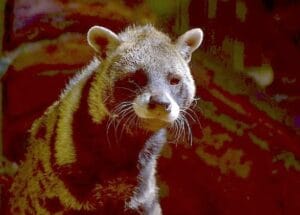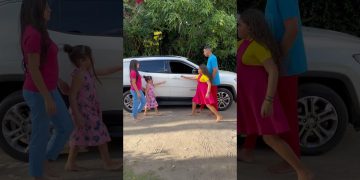
African Civet, a member of the Viverrid family.
There is a family of elusive and often overlooked animals facing a silent crisis across the globe. Viverrids are a group of small mostly nocturnal carnivores, native to Afro-Eurasia, including civets, genets, linsangs, and binturong. This group faces serious risk from a growing exploitative pet trade and cruel civet coffee production practices, each inflicting terrible suffering on hundreds of thousands of civets every year.
Often identified by their slender bodies, long tails, and distinctive spotted or striped coats, Viverrids typically live solitarily in forests or dense vegetation, feeding on insects, small mammals, and fruits. There are currently 33 recognised species within the Viverridae family, 13 of which appear on the IUCN Red List, a comprehensive international record of ‘at risk’ taxa.

(Photo Credit: Cerys Deakin – The Civet Project)
In response to this emergency, animal professionals, caregivers, conservationists and charities, such as Wild Welfare, gathered for the UK’s first-ever conference dedicated to championing and protecting these underrepresented species. This ‘first of its kind’ 2-day workshop hosted in partnership with The Civet Project Foundation and The British and Irish Association of Zoos and Aquariums (BIAZA) Mammal Working Group, aimed to improve care, conservation and welfare of populations both in the wild and captive environments, with a particular emphasis on the now endangered Owston’s Civet.

The Civet Project Foundation’s expansive stand at the event.
The conference hosted a diverse schedule of talks and presentations, with guest speakers covering a range of topics including the stories of successful captive breeding with endangered binturongs, and the discussion of implementing practical enrichment in captive civet enclosures. Researchers shared insights into civet natural behaviours, while others presented updates on wild population numbers across Asia and Africa. Many presentations highlighted the precarious situation facing these threatened species all across their natural range, from human-wildlife conflict to habitat loss and snaring.
For the first time, professionals from different backgrounds had the opportunity to collaborate and work together within the same space, to help advance the protection of these underrepresented animals. The workshop offered guests a vital platform for networking and idea sharing across the diverse community of professionals.

Wild Welfare’s Sarah Bonser-Blake presenting at the workshop.
Sarah Bonser-Blake, Wild Welfare’s Animal Welfare Field Manager, was in attendance to deliver an insightful presentation on “Captive Care Guides for Range Country Sanctuaries,” emphasising the need for accessible and translated resources for viverrid caregivers. Sarah showcased Wild Welfare’s “Care For Us” guides, explaining how these freely accessible resources improve care and welfare for captive animals. The charity offers animal caregivers worldwide free access to informative downloadable guides in multiple languages. The popular Binturong guide, especially the Bahasa Indonesia translation, provides scientifically backed information on how caregivers can best provide for and encourage species-specific behaviours that optimise animal welfare conditions.
This year, Wild Welfare is developing a new, more in-depth format for their Asian Palm Civet guide, in partnership with The Civet Project Foundation. Expanding the guide format to 19 pages, this comprehensive document features detailed information about how to optimise welfare when caring for this unique species. The new guide contains useful infographic imagery, including a body condition score chart and animal activity graphs.

Binturongs are one of the larger members of the viverrid family.
Over the past year, Wild Welfare and The Civet Project have forged a strong partnership in their shared commitment to civet welfare and conservation. The two organisations combined resources and expertise to develop a long-term plan for shaping a positive future of these threatened species. Wild Welfare, with its global reach and focus on improving animal welfare standards, has provided support to The Civet Project’s research and advocacy efforts. This collaboration has helped to strengthen their key messages, raising awareness about the plight of civets and the ethical concerns surrounding the growing civet coffee tourism industry.
“Educating the public about the plight of civets is crucial to our mission,” explained Jes Hooper, Founder of The Civet Project. “We’ve recently highlighted the untold truths behind civet coffee and its harmful tourism trade. Civets are captured from their habitats, confined in unsanitary enclosures, and forced to produce coffee beans from their faeces. This causes immense suffering for the animals, simply to meet growing tourism demand”. The charity’s successful collaborative documentary film “Civet Coffee: From Rare to Reckless” helped to promote greater consumer awareness, while advocating for stricter regulations in the industry. Their accompanying report “Industry Leaders: Tackling the Civet Coffee Tourism Industry” further succeeded in the removal of civet coffee tour sales from world leading travel sights including TripAdvisor, TUI, and Booking.com.

(Photo Credit: Cerys Deakin – The Civet Project)
The conference, held at Dudley Zoo, offered organisations and charities like Wild Welfare the chance to host a stall to directly connect with attendees and share information about their vital work. “Our stand provided an invaluable opportunity to introduce Wild Welfare’s work to a broader audience, including international delegates,” Sarah explained.
“I really enjoyed connecting with everyone at the conference,” expressed Sarah. “Everyone was very excited by our Civet resources and very keen to help with their development where possible. We had many people offering to volunteer their time and expertise to help. Enthusiastic energy like that always gives the Wild Welfare team a great boost.” This collaborative spirit, coupled with a growing recognition of the plight of viverrids, offers an optimistic insight into the future of these endangered yet captivating creatures.
To find out more about these wonderful species and help support the organisations promoting these voiceless animals, please visit thecivetproject.com.
ENDS
Notes to Editors
Headline Photo Credit: © Le Van Dung
For more information or interview requests please contact Wild Welfare on communications@wildwelfare.org
Wild Welfare is a global organisation committed to improving animal welfare for captive wild animals. By uniting the world’s leading zoos, zoo associations and animal welfare organisations, we build trusting partnerships that help provide long-term solutions to critical wild animal welfare issues.
Wild Welfare is devoted to improving the welfare of captive animals across the world. You can support our efforts by sharing this article, signing up to our newsletter, following our social media accounts (Facebook and Instagram), or by making an online donation. Every small contribution can help us to develop our vital accessible animal resources. Thank you.
Our vision is to end the suffering of captive wild animals around the world and ensure full and sustainable protection is given to all animals in human care. Find out more at wildwelfare.org. Registered charity in England (no.1165941).









Discussion about this post